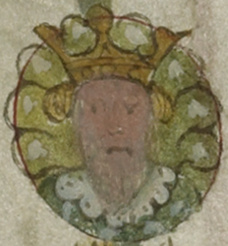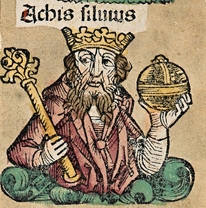Related Research Articles
The Battle of Badon, also known as the Battle of Mons Badonicus, was purportedly fought between Britons and Anglo-Saxons in Post-Roman Britain during the late 5th or early 6th century. It was credited as a major victory for the Britons, stopping the westward encroachment of the Anglo-Saxon kingdoms for a period.

Cadwaladr ap Cadwallon was king of Gwynedd in Wales from around 655 to 664 or 682. He died in one of two devastating plagues that happened in 664 and in 682. Little else is known of his reign.
Maddan was a legendary king of the Britons as accounted by Geoffrey of Monmouth. He came to power in 1100BC. He was the son of King Locrinus and Queen Gwendolen, who both ruled Britain separately.

Brutus Greenshield was a legendary king of the Britons as accounted by Geoffrey of Monmouth. He was the son of King Ebraucus and came to power in 1001BC.

Leil was a legendary king of the Britons as accounted by Geoffrey of Monmouth. He was the son of King Brutus Greenshield and came to power in 989BC.

Bladud or Blaiddyd[a] is a legendary king of the Britons, although there is no historical evidence for his existence. He is first mentioned in Geoffrey of Monmouth's Historia Regum Britanniae, which describes him as the son of King Rud Hud Hudibras, and the tenth ruler in line from the first king, Brutus, saying Bladud was contemporaneous with the biblical prophet Elijah.

Leir was a legendary king of the Britons whose story was recounted by Geoffrey of Monmouth in his pseudohistorical 12th-century History of the Kings of Britain. According to Geoffrey's genealogy of the British dynasty, Leir reigned around the 8th century BC, around the time of the founding of Rome. The story was modified and retold by William Shakespeare in his Jacobean tragedy King Lear.
Cunedagius was a legendary king of the Britons, as recounted by Geoffrey of Monmouth. He came to power in 850BC.
Rivallo was a legendary king of the Britons as accounted by Geoffrey of Monmouth. He came to power in 817BC.
Porrex I was a legendary king of the Britons as accounted by Geoffrey of Monmouth. He was the son of Gorboduc. and his death began a dynastic civil war.
Dyfnwal Moelmud was accounted as an early king and lawmaker among the Welsh, credited with the codification of their standard units of measure. He also figures as a legendary king of the Britons in Geoffrey of Monmouth's pseudohistorical History of the Kings of the Britons.
The Molmutine Laws were the laws said to have been instituted over the Britons by Dyfnwal Moelmud, who is also referred by the Latin form of his name, Dunvallo Molmutius. The Laws were most famously described by Geoffrey of Monmouth in his Historia Regum Britanniae. Little remains known of these laws, with surviving Welsh codes simply noting that Dyfnwal's laws were largely superseded by the new codes instituted by Hywel Da. Hywel was said, however, to have retained Dyfnwal's units of measurement.
Marcia was the legendary third female ruler and a regent of the Britons, as recounted by Geoffrey of Monmouth. She is presented by Geoffrey as "one of the most illustrious and praiseworthy of women in early British history".
Sisillius II was a legendary king of the Britons as recounted by Geoffrey of Monmouth. He came to power in 373BC.
Elidurus the Dutiful was a legendary king of the Britons as recounted by Geoffrey of Monmouth. He reigned in the late fourth century BC. He was the third son of King Morvidus and brother of Gorbonianus, Archgallo, Ingenius, and Peredurus.

Historia regum Britanniae, originally called De gestis Britonum, is a pseudohistorical account of British history, written around 1136 by Geoffrey of Monmouth. It chronicles the lives of the kings of the Britons over the course of two thousand years, beginning with the Trojans founding the British nation and continuing until the Anglo-Saxons assumed control of much of Britain around the 7th century. It is one of the central pieces of the Matter of Britain.
Keredic was a legendary king of the Britons, as recounted by Geoffrey of Monmouth. The origin of Geoffrey's character is unknown, but he is not depicted as a Saxon. According to Geoffrey, Keredic's rule was so unpopular that the Saxons enlisted the aid of an army of Vandals from Ireland to drive him from his kingdom.
Mandubracius or Mandubratius was a king of the Trinovantes of south-eastern Britain in the 1st century BC.

In Roman mythology, Atys was a descendant of Alba and the sixth king of Alba Longa. Geoffrey of Monmouth asserted in his Historia Regum Britanniae that Silvius succeeded Alba at the same time that Solomon began to build the Temple in Jerusalem, and king Leil of Britain founded Carlisle. The king is thought to be the Ancestor of Atia gens.